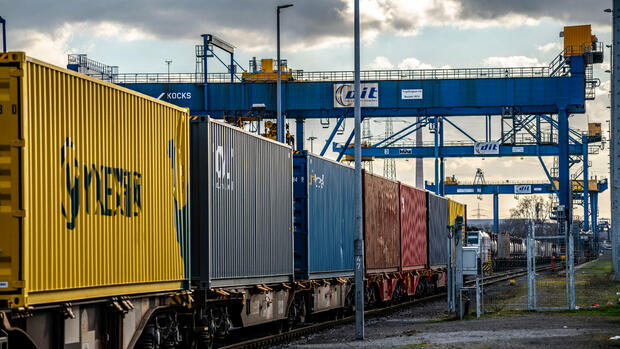The federal government expects GDP growth of 0.4 percent for the current year as a whole.
(Photo: IMAGO/Jochen Tack)
Berlin The German economy slipped into a recession due to falling consumer spending by inflation-plagued consumers. The gross domestic product (GDP) shrank from January to March by 0.3 percent compared to the previous quarter and thus for the second quarter in a row, as the Federal Statistical Office announced on Thursday.
It thus revised its original estimate from the end of April, which had still shown stagnation. If there are two negative quarters in a row, there is talk of a recession. In the fourth quarter of 2022, economic output fell by 0.5 percent.
“The frequently used criterion for a technical recession has been met,” commented Commerzbank chief economist Jörg Krämer on the development. “The massive increase in energy prices took their toll in the winter months.” A fundamental improvement is not in sight, as the decline in the Ifo business climate barometer indicates.
The economy was slowed down by shrinking private consumption. This fell by 1.2 percent in the first quarter. One reason for this is likely to be the consumers’ loss of purchasing power as a result of high inflation. According to the statisticians, “private households were reluctant to buy in various areas”.
“Private households spent less on food and beverages, clothing, shoes and furnishings than in the previous quarter.” In addition, fewer new cars were bought, which is also due to the discontinuation of premiums for plug-in hybrids and the reduction in the premiums for electric vehicles at the beginning of the year.
No strong upswing in sight
Government consumption also fell, by 4.9 percent. On the other hand, positive impetus came from investments, which grew by 3.9 percent. Here, construction investments in particular increased because the mild winter meant that most of the work could continue. Foreign trade also supported the economy, as 0.9 percent more goods and services were exported. Imports, on the other hand, fell by 0.9 percent.
A strong upswing is not in sight for the time being. The Bundesbank expects at least slight growth in the spring. “In the second quarter of 2023, economic output should increase again slightly,” says the current monthly report. Easing delivery bottlenecks, high order backlogs and lower energy prices should then ensure a recovery in industry. “This should also support exports, especially since the global economy has regained some momentum,” the Bundesbank expects.
The federal government expects GDP growth of 0.4 percent this year. In 2024, there should then be a stronger increase of 1.6 percent. For comparison: last year there was growth of 1.8 percent.
More: The winners and losers of high food prices
